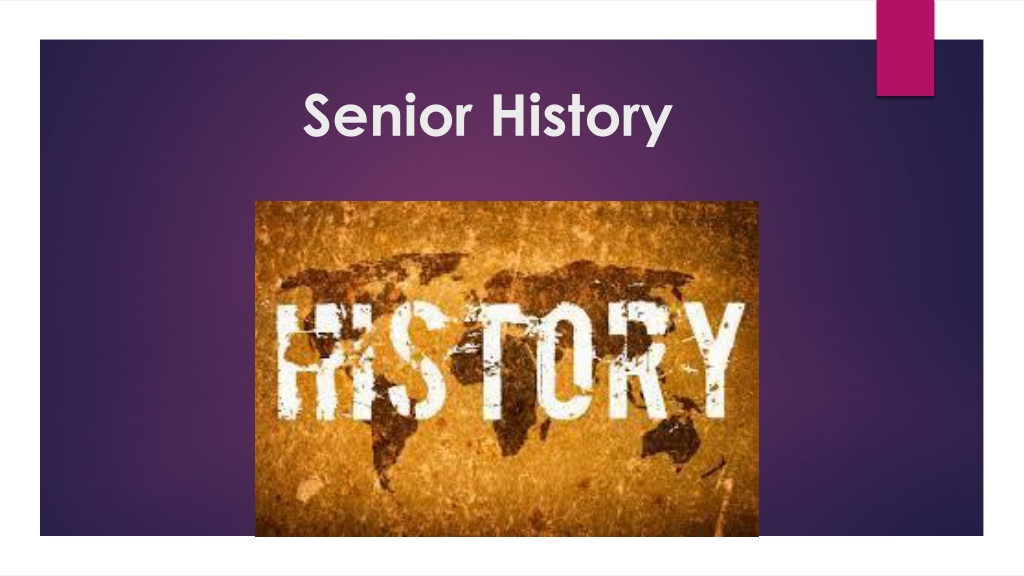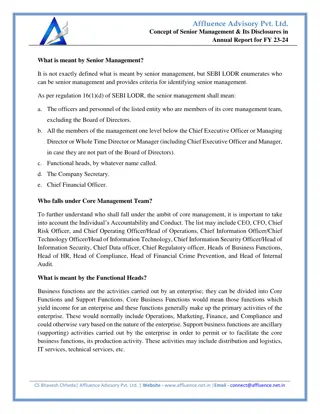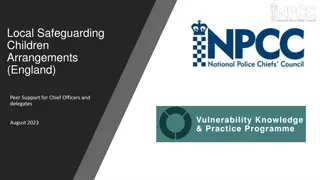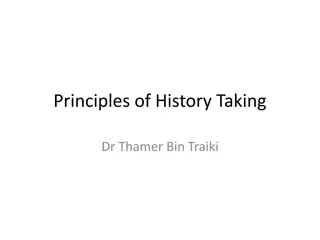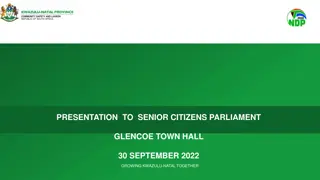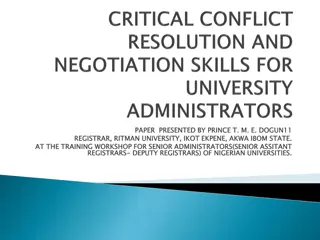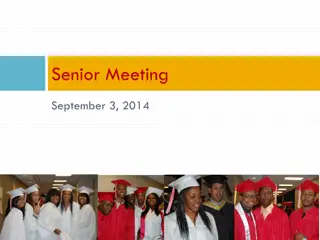Senior History
Delve into the ancient world with Senior History's unit on Investigating the Ancient World. Explore various ancient societies, from Old Kingdom Egypt to the Vikings, through topics like art, architecture, warfare, technology, and more. Uncover the lives, beliefs, and practices of people from different eras, and develop critical historical analysis skills. Choose from intriguing topics and engage in source investigations to deepen your understanding of the past.
Download Presentation

Please find below an Image/Link to download the presentation.
The content on the website is provided AS IS for your information and personal use only. It may not be sold, licensed, or shared on other websites without obtaining consent from the author.If you encounter any issues during the download, it is possible that the publisher has removed the file from their server.
You are allowed to download the files provided on this website for personal or commercial use, subject to the condition that they are used lawfully. All files are the property of their respective owners.
The content on the website is provided AS IS for your information and personal use only. It may not be sold, licensed, or shared on other websites without obtaining consent from the author.
E N D
Presentation Transcript
Course Structure Unit overview Assessment Each unit consists of 2 topics There ore 4 types of assessment: Unit 1 and 2 go for 15 weeks each. Examination Short responses to historical sources Unit 3 and 4 go for 18 weeks each. Investigation independent source investigation Investigation historical essay based on research The topics that have been investigated in the past are in red, however may change depending on the teacher, student interest, and available resources Examination essay in response to historical sources
Unit 1: Investigating the Ancient World Unit description In Unit 1, students investigate how the ancient past has been represented. Students explore the remaining sources and how they have been interpreted. Students focus on issues relevant to the investigation of the Ancient World in order to develop the skills of historiography. Students study issues related to evidence, including authentication, preservation, ownership and/or display of material from the Ancient World. Students also investigate how people lived in the Ancient World through an examination of the evidence of the social, political and economic institutions, and other significant features of society. The key conceptual understandings of this unit include: reliability and usefulness of sources; custodianship of the past; interpretations, representations and perspectives; the nature of evidence; continuity and change; cause and effect; significance; empathy; and contestability. Key inquiry questions for this unit: What can archaeological evidence tell us about the lives of ancient peoples? How do ancient societies reflect the attitudes, beliefs and behaviours of ancient peoples?
Unit 1: Investigating the Ancient World Unit requirements Students will complete two topics Topic 1: Digging up the past, and a choice of topic from the following: Topic 2: Ancient societies Slavery Topic 3: Ancient societies Art and architecture Topic 4: Ancient societies Weapons and warfare Topic 5: Ancient societies Technology and engineering Topic 6: Ancient societies The family Topic 7: Ancient societies Beliefs, rituals and funerary practices.
The Ancient societies that may be selected are: Old Kingdom Egypt (3rd to 6th Dynasty) Egypt in the Ramesside Period (19th and 20th Dynasties) Israel and Judah (961 586 BCE) Archaic Greece (900 600 BCE) Roman society (753 133 BCE) Persian society (559 330 BCE) Spartan society (c. 700 371 BCE) Indian society in the Mauryan Empire (321 185 BCE) Ptolemaic Egypt (331 31 BCE) Ancient China in the Qin and Han Dynasties (221 BCE 220 CE) The Early Christians (to 337 CE) The Celts (1200 BCE 60 CE) The Vikings (700 1100 CE)
Unit 2: Personalities in their times Unit description In Unit 2, students investigate key personalities of the Ancient World in the context of their times. Students examine the social, political and economic institutions in which the personality is positioned and focus on an analysis and evaluation of the differing ways in which they have been interpreted and represented from ancient to modern times. Students consider the attributes that characterise a significant ancient personality and the driving forces behind such individuals. In this unit there is a focus on the key conceptual understandings of: context, reliability and usefulness of sources; perspectives and representation; evidence; continuity and change; cause and effect; significance; empathy; and contestability. Key inquiry questions for this unit: What were the motivations, attributes and achievements of significant ancient personalities? Are great leaders born, not made? Do people make history or are they a product of history?
Unit 2: Personalities in their times Unit requirements Two topics are studied in this unit. The topics that may be selected are: Topic 6: Hannibal Barca Topic 7: Cleopatra Topic 8: Agrippina the Younger Topic 1: Hatshepsut Topic 9: Nero Topic 2: Akhenaten Topic 10: Boudica Topic 3: Xerxes Topic 11: Cao Cao Topic 4: Perikles Topic 12: Saladin (An-Nasir Salah ad-Din Yusuf ibn Ayyub) Topic 5: Alexander the Great Topic 13: Richard the Lionheart
Unit 3: Reconstructing the Ancient World Unit description In Unit 3, students investigate significant historical periods through an analysis of relevant archaeological and written sources. Students examine how these sources have been used to construct an understanding of relevant social, political, religious and economic institutions and practices, key events and individuals of a historical period. This unit allows for greater focus on historiography and challenges associated with an interrogation of evidence. Students analyse the usefulness of a wide range of sources and the contribution of research and scholarship to the reconstruction of a historical period. Students develop their understanding of changing interpretations over time and appreciate the contestable nature of history and the value of the ancient past. Key conceptual understandings include: usefulness and reliability of sources, perspectives, interpretations and contestability; evidence; continuity and change; cause and effect; significance; and empathy. Key inquiry questions for this unit: How is meaning concerning certain periods of history constructed from historical evidence? What features, achievements and issues distinguish significant historical periods of Antiquity?
Unit 3: Reconstructing the Ancient World Unit requirements Two topics are studied in this unit. The topics that may be selected are: Topic 5: Philip II and Alexander III of Macedon Topic 6: Early Imperial Rome Topic 1: Thebes East and West, 18th Dynasty Egypt Topic 7: Pompeii and Herculaneum Topic 8: Later Han Dynasty and the Three Kingdoms Topic 2: The Bronze Age Aegean Topic 3: Assyria from Tiglath Pileser III to the fall of the Empire Topic 9: The Fall of the Western Roman Empire Topic 4: Fifth Century Athens (BCE) Topic 10: The Medieval Crusades.
Unit 4: People, power and authority Unit description In Unit 4, students investigate an ancient society in an important historical period, with a particular emphasis on the nature and exercise of power and authority in that society, and how it was challenged in times of conflict. Students also study an individual who had a significant impact on that society. Students develop an understanding of the importance of human agency, as demonstrated by the possible motivations and actions of individuals. This unit requires a greater focus on a range of written source material and an evaluation of the significance of the selected individual. It examines the key phases by which power and authority are challenged by conflict causation, course, and consequences and, through these, the important concepts of historical continuity and change. Other key conceptual understandings include: usefulness and reliability of sources; perspectives, interpretations and contestability; evidence; significance; and empathy. Key inquiry questions to guide this unit: How was power and authority gained, maintained and challenged in the Ancient World? How does this understanding inform our modern perspectives on power?
Unit 4: People, power and authority Unit requirements Two topics are studied in this unit one from Topics 1 5 and one from Topics 6 12. Schools choose one study of power from: Topic 1: Egypt New Kingdom Imperialism Topic 2: Greece the Persian Wars Topic 3: Greece the Peloponnesian War Topic 4: Rome the Punic Wars Topic 5: Rome Civil War and the breakdown of the Republic. QCAA will nominate one topic that will be the basis for external assessment from: Topic 6: Thutmose III Topic 7: Rameses II Topic 8: Themistokles Topic 9: Alkibiades Topic 10: Scipio Africanus Topic 11: Julius Caesar Topic 12: Augustus.
